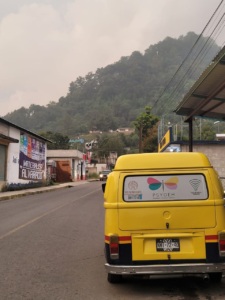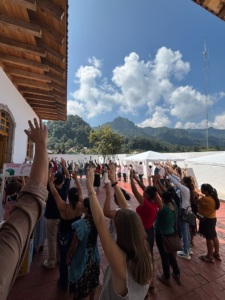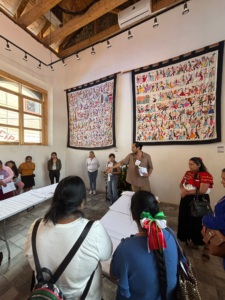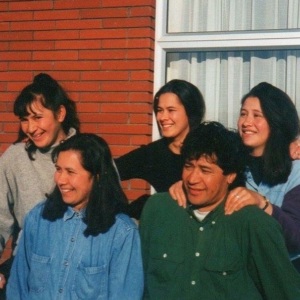Spending time, together
Written by Samuel Aoake Austin
Arriving in Tenango de Doria, a pueblito (small town) nestled in the Hidalgo mountains a few hours north-east of Mexico City, I found myself feeling as though I had come a little closer to home. In reality, my whare (house) now evaded me by two 3-hour car journeys and a 15-hour flight. But this solid, inexorable fact seemed to soften at the edges as we drove further into Tenango. But, why? Why do I feel nearer to home? Why has the homesickness that’s been sitting in my belly these last months, like a pebble in a shoe, suddenly quietened down?
I’m an indigenous boy from Aotearoa (New Zealand). I’m Māori. And I, like many indigenous people today, have a complex relationship with this part of my identity. You might already know why. If not, I will sum it up quickly. Being indigenous by blood, but growing up estranged from the language and cultural practices (shout out to colonisation) and often surrounded by racist rhetoric (shout out to popular media) has at times made me feel like a fraud in Māori spaces and afraid to claim that I am indigenous at all. Ko faux Māori ahau.
This challenge is far less now than it was 5 years ago, but it remains. It’s there in my discomfort when I’m at the Marae (a communal space for Māori) or when I think of how little time I have spent with my wider iwi and hapū (my tribe). But it no longer stops me from stepping into indigenous spaces. I am grateful for and sure of my Indigenous identity. Despite the linguistic estrangement, I know that this part of me, my Māori, defines a large chunk of who I am and has embedded a value system that I couldn’t shrug off even if I wanted to.
I have spent the last several years working in Indigenous development, largely in public health policy for the New Zealand government. Over my relatively short career, I have been part of world-leading responses to international health emergencies, worked with communities across the country and have had the privilege to learn alongside some of the most brilliant indigenous minds, and more often than not, these brilliant minds have belonged to women. Always, I have been taught that working in indigenous spaces means working closely with the communities you serve. Nothing about us, without us. And, I’m here in Tenango, to do just this.

I simmer with quiet excitement, tucked in the backseat between piles of stationery and gear. Gis and Jorge are sitting in the front. The concrete-heavy town contrasts considerably with the forested hills that tower over it. Pocket-sized waterfalls are dotted amongst dense bush and cliff faces.
We arrive at a gravel space that might be a parking spot, except that it’s cluttered with tools and odd bits of building scraps that remind me of my carpenter dad. Up above, two middle-aged men (both in jeans and one donning a cowboy hat) are working. The construction site is classically Mexican – meaning it might not pass the safety standards in New Zealand but it seems to work perfectly well here.
Walking beyond the gravel lot, we climb some stairs and arrive at our accommodation: a three(ish) bedroom, bright orange house, built of cement. There’s a small, overgrown yard out front that includes some impressively wild tomato vines (that will soon be tragically mowed over). Across the yard is a bathroom with a toilet that might not flush and a shower that definitely won’t get hot. PSYDEH, the organisation I’m interning with, has been renting this little haven for some years. It serves as the business hub for them here in Tenango and provides a bed (or seven) when the out-of-town staff come to visit. Already at the house waiting are Les & Gibran. They have made a start on the work – sweeping, mopping, arranging beds, planning for the days ahead. I will soon learn that this team is overflowing with initiative and work-ethic.
Before I go further, I should explain a little about PSYDEH. PSYDEH is a local Non-Government Organisation that supports rural and indigenous women in the Otomí, Tepehua, and Náhuatl communities in the state of Hidalgo. They run grass-roots programmes that tackle some of the greatest challenges their socias (members) are facing – including technological isolation, civil participation, and the ongoing impact of gender-based discrimination. I will be interning with PSYDEH for some months, and this meeting in Tenango marks the first time I am meeting the team in person.
We* are all there to support PSYDEH’s 9th Encuentro Regional de Mujeres. An annual event PSYDEH holds to bring together their socias. The specific objectives of the Encuentro change each year. This year, the event is centred around ‘cuidado’ – care – and the socia’s right to care in all its forms (you can learn more about this and the agenda of the day here). The event also allows time to celebrate the progress made since the last Encuentro and agree on a new manifiesto – a shared direction for the upcoming year. But, as is often the case with our wānanga (encuentros) in Aotearoa, the day provided much more than just a document.
Starting early on the 6th of September, a day after the International Day of Indigenous Women, the Encuentro was held in the new Centro Cultural in the centre of Tenango. It opened with a ceremonial offering known as the Tlalmanalli, guided by Felicia Tlalacalco Martínez and supported by PSYDEH’s own Leslie Pérez. Participants were invited to breathe gently and stretch, to ground ourselves before the day. The ceremony also honoured the four cardinal directions—east, south, west, and north—as well as the sky above and the earth below, reflecting ancestral Toltec influences from central Mexico.

It reminded me of the waiata (songs) and karakia (prayers) that preface almost every wānanga I have been to in Aotearoa. Where we all sing in chorus. A song filled with harmonies and vibrato. A song that is sung without rehearsal because it is a tradition that precedes the need for rehearsal. To be honest, I used to find these cultural practices a little … silly. A healthy (?) dose of internalised racism had constructed an idea that these songs and prayers were just superficial stamps of ‘culture’ that we had to act out because it’s what a colonial system had dressed us as. As if it were our party trick.
I’m glad to be far from this belief now. The use of old traditions in a contemporary context is wonderful. These little acts and shared rituals remind us of our uniqueness. They also remind us to take time. To rest a moment. In a world focused on capitalist production and the ‘grind’, taking 5 minutes to thank the land and sky or sing in unison feels like a small act of rebellion. It’s who we are, where we come from, and what we are protecting by being here and doing this work.

Throughout the day, socias led various discussions and reflections on their work and the year passed. The day ended with workshops discussing the dimensions of care and understanding the many forms that the socias experience and express care. Finally, several of the women walked to the stage to read out an agreed manifiesto for the year forward – sharing their demands for a system that recognises and supports their right to care. Similar demands that we have made for our wāhine (woman) in Aotearoa over the last decades. Demands for equitable access to quality and consistent care. Demands for meaningful system accountability. Demands for systemic reform that centres the needs and rights of indigenous and rural women. The youngest of those on stage proclaiming her demands was still in her teens, but she spoke with the conviction of a kaumatua (elder).
I think this moment – a young mujer standing amongst whānau, her voice amplified by the fortitude of community, reflects the reason I really do give a shit about events like this. These events are more than deliverables and documents. Whether an encuentro or wānanga, they allow us to spend time together. The socias spent time with other socias. Socias spent time with the team at PSYDEH. The team at PSYDEH spent time together. We enjoyed the day, shared greetings, and talked about what matters to us. We worked hard, together.
In te ao Māori (the Māori world) we have a slew of values that are innate to our culture. Amongst these values is kotahitanga – unity. When we wānanga – come together kanohi-ki-te-kanohi (face-to-face) to discuss and learn and teach – we are not just doing this because it’s the easiest way to share mātauranga/knowledge. We do it because being together – physically – is foundational to building a sense of community, to building kotahitanga. Being close with your community, whether to share insights, cackle or just eat mole, is what reminds us of our purpose. We do this work for our whānau, so we need to spend time with our whānau.

To close this reflection, I want to go back to how I started – wondering why I felt closer to home, despite being further away than I had been in months. Well, I was brought up surrounded by exceptionally strong, sophisticated, and stubborn indigenous women. My Māori family is irrefutably matriarchal. My greatest heroes are the women in my family. So, when I think about the days I spent in Tenango: being surrounded by indigenous and rural women, working within a team of people who are completely committed to supporting these women, and being driven by the same passion for kotahitanga that I have held since I was young, it becomes clearer. I was less homesick because I was, in every non-physical way, closer to home. Closer to a cause I believe in. Closer to community.
*The team from PSYDEH working on the Encuentro included:
- Jorge Echeverría
- Hannah Swenson
- Gibrán Gómez
- Katie Freund
- Gisela Bértora
- Leslie Pérez
- Kell Aponte
- Massimo Campagna
- Aislinn Belmán
